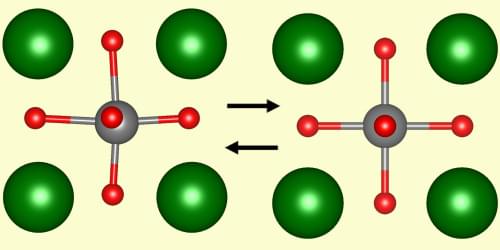Ultraviolet photons induce potassium niobate to behave like a potent solid-state refrigerant, according to new calculations.
Claudio Cazorla of the Polytechnic University of Catalonia in Spain and his collaborators have used a suite of numerical methods to discover that the archetypal ferroelectric material, potassium niobate (KNO), also exhibits a photocaloric effect: In response to ultraviolet light, KNO reversibly absorbs heat [1]. Because the effect is large and works at a wide range of temperatures, including room temperature, KNO could serve as the working medium for new cooling devices.
KNO owes its ferroelectric and photocaloric effects to its perovskite crystal structure, which features a niobium ion surrounded by an octahedral cage of oxygen ions. At low temperatures, the niobium ion is offset from the cage’s center, which induces an electric polarization (the ferroelectric effect). Above 700 K, KNO adopts a nonpolar configuration as its most stable phase.
